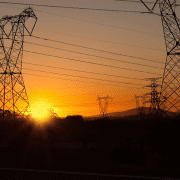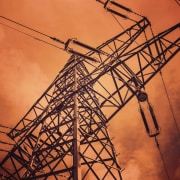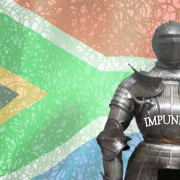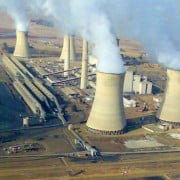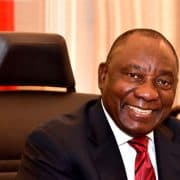|
Getting your Trinity Audio player ready...
|
Image: YouTube / Parliament of South Africa
Former Eskom CEO Andre de Ruyter appeared virtually on 26 April 2023 before the parliamentary Standing Committee on Public Accounts (Scopa) to elaborate on the allegations he made in a now widely shared February 2023 television interview television interview on e.tv, regarding his knowledge of corruption within the state-owned entity.
However, De Ruyter left the Scopa meeting with the big question still unanswered – who are the minister and senior politician who, he alleges, are part of the corruption?
In fact, his refusal to name names left not just the committee members unhappy, but political analysts were thoroughly dissatisfied too – not to mention the general South African public.
In the words of Khaya Sithole, “De Ruyter … was far removed from the anti-corruption crusader seen in the interview on e.tv a few weeks ago. Rather than use the national platform to finally state how deep the corruption he confronted at Eskom was, De Ruyter has found comfort in the old accountability safety net of refusing to speak in order to avoid compromising investigations.”
This sub judice excuse is nothing but a ploy, Sithole adds, which politicians have developed to a fine art because they think it absolves them from commenting on matters under investigation, on the pretext that the investigation may be adversely affected.
The phrase means “under judgment”, but the power in these words is entirely illusory. The sub judice rule is an extension of the common law rule that the proper administration of justice may not be prejudiced or interfered with. Politicians are understandably fond of the sub judice rule because it gives the appearance of legitimacy to their refusal to answer questions relating to pending legal proceedings.
“So while the Phala Phala saga was broken almost a year ago,” says Sithole, “President Cyril Ramaphosa can argue that he can’t say anything about it for as long as some element of law enforcement is looking into the matter.”
In a constitutional democracy like South Africa’s, however, competing rights must be weighed and balanced against each other.
There is nothing absolute or inviolable about the words sub judice, and the public’s right to know will often trump this awkward rule in court.
Political and economic journalist Carol Paton notes that: “Wednesday’s events were a triumph for anyone hoping to continue with corruption at Eskom.” This despite the fact that De Ruyter’s submission to the committee provides a disturbing overview of the scope and extent of the corruption at Eskom.
She adds that the George Fivaz investigation De Ruyter commissioned because law enforcement agencies were slow to act, is apparently marred by “outlandish conspiracy theories and leaps of logic. Worse still was [Jacques] Pauw’s discovery that the investigator who compiled them was found to have been an apartheid spy and murderer.”
Scopa on the hunt for information
Scopa members were disappointed with De Ruyter’s refusal to go into further detail on his allegations, due to, he said, the sensitivity of the matters.
“On several occasions, Mr De Ruyter refused to inform Members who the senior politician was that he had alleged in the interview had been involved in the corruption taking place within Eskom,” the meeting report notes.
Committee member Bheki Hadebe asked De Ruyter outright to reveal the names of the two people he had alluded to in his television interview. “Who was the official involved? I take it that those two characters, the minister and the official, are still continuing business as usual and are still executing the role and responsibilities entrusted upon them. And who knows, they might be continuing, allowing or enabling an environment where corruption must prevail. So, ours here is to pursue a path that will lead us to rooting out corruption at Eskom. Hence, I am pleading with you to share with us the name of that particular Minister.”
However, De Ruyter refused, saying among other things, that he did not point fingers at a minister – to which Hadebe responded that in the e.tv interview, De Ruyter himself revealed that he had approached a minister with the allegations of corruption against a senior political figure, and the minister appeared completely unsurprised.
De Ruyter then said he did not feel it critical to reveal that information at that moment. “I do not think it is in the interests of the oversight role of Scopa and the nature of the engagements that I disclose this today.”
He emphasised that he had already given that information to shareholder minister Pravin Gordhan and national security advisor Sydney Mufamadi, and that the main purpose of the committee meeting was to delve into the potential misuse of public funds.
Even after Scopa chairperson Mkhuleko Hlengwa noted that having a minister knowing of the alleged corruption, as De Ruyter had implied, is indeed in the interests of the committee, and that Hadebe had posed a fair question, the former CEO stood firm.
But, says Sithole, De Ruyter may want to “reflect on the question of whether his conduct does not, in fact, amount to complicity in the grand crime of looting Eskom.”
In any case, Scopa is determined to get to the bottom of the mystery and is mulling over summoning in the near future not only Gordhan and Mufamadi, but the Eskom board as well. Additionally, the committee is interested in meeting with the Auditor-General, Special Investigating Unit, Hawks, and the national police commissioner. After this, Scopa members will deliberate on the way forward.

